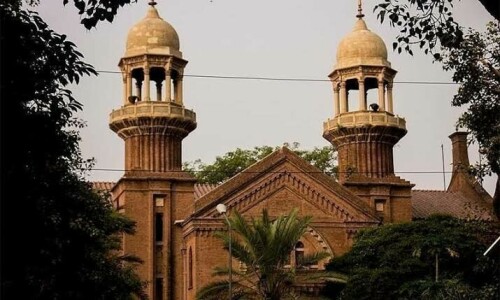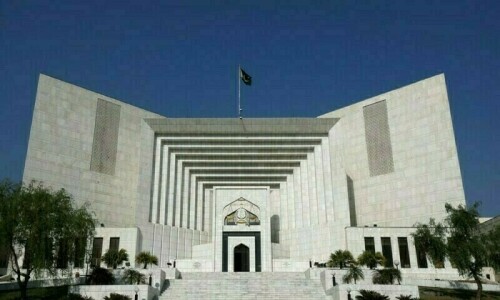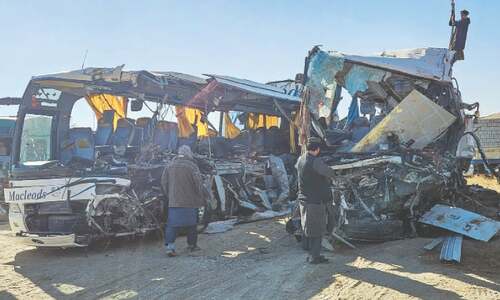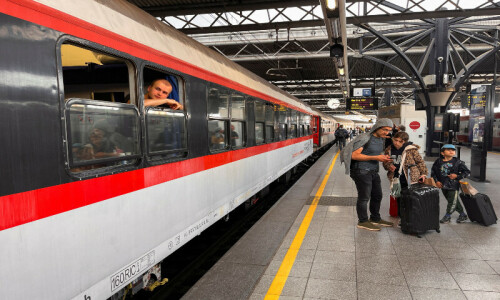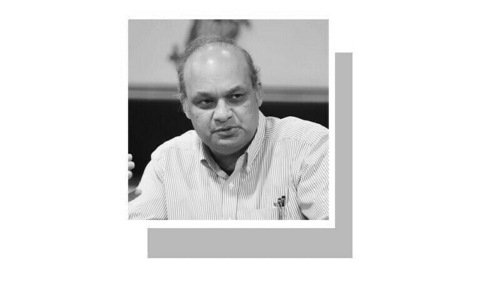
KARACHI: In a meeting with an American diplomat in July 2009, ANP leader Senator Afrasiab Khattak claimed that the Haqqani network, a militant group the US holds responsible for multiple attacks against coalition forces in Afghanistan, was being protected by the Pakistan military.
The report is one of a number of American diplomatic cables obtained by Dawn that reveal a deep mistrust among the leadership of the ANP, the party responsible for governance in Khyber Pakhtunkhwa, about the military’s intentions regarding various militant groups in KP and FATA.
“Khattak described the Pakistani military as treating the Haqqanis ‘separately’ … from other militants,” reported Lynne Tracy, the Principal Officer at the US Consulate in Peshawar. “The Haqqani family, [Khattak] observed, has already moved out of North Waziristan.
“Part of the family, he said, is living in a rented house on the Kohat Road on the southern side of Peshawar. The other half is living in a house owned by the Haqqani family in the Rawalpindi cantonment.”
America has unsuccessfully been pressuring Pakistan to pursue the Haqqani network, which it considers one of its deadliest opponents in Afghanistan. This month the US State Department added one of Jalaluddin Haqqani’s sons to America’s list of global terrorists, on which the leader and two other sons are already listed.
In the July 2009 meeting Mr Khattak also criticised “a purported ISI plan to release Tehrik-i-Nifaz-i-Shariat-i-Mohammadi (TNSM) leader Sufi Mohammad” as the second Swat operation was winding down.
“Khattak told PO July 3 that ISI is intensifying pressure on NWFP Chief Minister Haider Hoti to place TNSM leader Sufi Mohammad in ‘provincial protective custody’ as part of an ISI plan to engineer the surrender of senior Tehrik-i-Taliban Swat leadership, including Mullah Fazlullah and spokesman Muslim Khan,” Ms Tracy reported.
“ISI-proposed terms … of ‘provincial custody,’ Khattak said, envisioned allowing the TNSM leader greater freedom of movement. In return, Sufi Mohammad would declare implementation of the Nizam-i-Adl regulation in Swat acceptable.” If he did so, according to Khattak’s description of the alleged ISI plan, TTP-Swat senior leadership would surrender.
In an indication of the civilian-military disconnect in the province, “Khattak declared flatly that the provincial government wanted nothing to do with this plan. Operations in Swat, he said, should come to a ‘logical conclusion’ - killing or capturing militant leadership.
“ANP leader Asfandyar Wali Khan … was also suspicious, Khattak commented, because ISI Director General Pasha had said nothing during a recent meeting about taking custody of Sufi Mohammad.”
In its comment on the meeting the Peshawar Consulate took note of the mistrust between the military and the provincial leadership and offered its own analysis about the military’s intentions: “While Khattak and other ANP leaders continue to voice respect for senior military leaders in Islamabad and Peshawar, there is tremendous suspicion of ISI and the role it is playing in the NWFP and FATA.
“Khattak commented at one point that ‘ISI’s strategy is to save the Taliban from defeat.’ ISI’s motives and activities are more complicated than that statement suggests. However, the ISI-brokered deal now being described would likely undermine any progress the military has made in reversing the public perception that the military and local Taliban are essentially the same entity.”
Suspicions about the military’s alliances can be seen at least as far back as cables written in 2006. In a meeting with the Peshawar Principal Officer in March that year, ANP chief and then Senator Asfandyar Wali Khan spoke about his plan for political reform in FATA.
One item involved “controlling ISI and the Afghan desk of the Pakistan Army in the FATA. … Operatives oftentimes support long-standing relationships with Taliban and Al Qaeda leaders that undermine the policy initiatives of senior GOP leaders.”
Later that month, Mr Khan “recommended the immediate transfer of all ISI agents from FATA that had previously worked with the Taliban and mujahideen.”
It is once the ANP is in power in KP that the relationship appears to become more interdependent. “Khan said that Kayani had so far played a ‘positive role’ when he took over ISI,” said an April 2008 cable, “closing six militant training camps identified by his party and removing ISI officers who had remained in the FATA too long.”
At the same time, however, Khan was extremely wary of the peace agreement with South Waziristan’s tribal elders being devised in April 2008. He “made clear that the agreement was drafted by Pakistan’s military, not its ruling political parties … going so far as to turn on a television to mask our conversation, perhaps reflecting ANP reservations over a deal that appears to have been largely brokered by the military rather than political forces.”
Cables referenced: WikiLeaks # 215774, 55435, 57538, 150498. All cables are available on Dawn.com.

